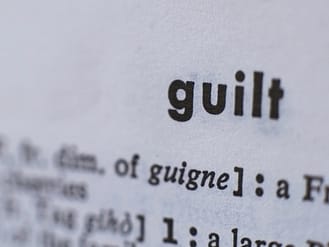Last updated on August 11th, 2023
How to Overcome Bad Guilt: Letting Go and Embracing Self-Compassion

Did you ever feel guilty for leaving work early to attend your child’s school event? Or perhaps you experienced guilt when cancelling plans with friends last minute? Or again when prioritizing self-care, feeling like you’re being selfish or neglecting others? For setting boundaries with people in your life, such as saying no to requests or asserting your own needs? Or for expressing your true feelings or opinions, fearing that it may upset or disappoint someone else? Or again for pursuing personal interests or hobbies, feeling like you should be focusing solely on productivity or obligations? If so, this article is for you. It’s time to let go of the guilt and embrace self-care and self-expression.
- Leaving work early to attend your child’s school event is not something to feel guilty about. Your child’s milestones and moments are precious and irreplaceable. Being there to support and cheer them on shows them that they are important to you.
- Cancelling plans with friends last minute can sometimes be unavoidable. It’s okay to prioritize your own mental and physical well-being. True friends will understand and support you in taking care of yourself.
- Setting boundaries is essential for maintaining healthy relationships. Saying no to requests or asserting your own needs does not make you selfish. It shows that you value your own time and energy, and it sets a precedent for others to respect your boundaries.
- Expressing your true feelings and opinions is a brave and authentic act. While it’s natural to fear upsetting or disappointing others, it’s important to remember that your thoughts and emotions are valid. By expressing yourself honestly, you create an environment of trust and open communication.
- Pursuing personal interests and hobbies is crucial for self-growth and fulfillment. It’s not a waste of time, nor does it mean you are neglecting your responsibilities. Taking time for yourself actually allows you to recharge and be more
Guilt is a common emotion experienced by many women, and it can be quite burdensome. In this post, we will delve into the signs of guilt, differentiate between good and bad guilt, explore why we feel guilty all the time, examine the impact of guilt on our well-being, and most importantly, discuss strategies to overcome guilt and stop feeling guilty.
What are the signs of feeling guilty?
Here are some signs that can indicate when someone is experiencing guilt:
- Increased irritability or mood swings: Guilt can cause a heightened sense of irritability and emotional ups and downs. For example, someone might become easily provoked by small things or display sudden mood swings when guilt is triggered. They may feel irritable with themselves or others, leading to strained relationships.
– - Difficulty concentrating or making decisions: Guilt can consume mental energy, making it challenging to focus on tasks or make decisions. For instance, someone who feels guilty about a past mistake at work may find it difficult to concentrate on their current assignments, hindering their productivity.
– - Physical symptoms: Guilt can manifest as physical symptoms such as headaches, muscle tension, or stomachaches. For instance, someone who carries the guilt of causing harm to another person might experience frequent headaches or gastrointestinal issues as a result.
– - Seeking reassurance or validation: Those experiencing guilt may constantly seek reassurance from others to reduce their feelings of self-doubt. They may ask for validation of their actions or decisions, seeking confirmation that they are not inherently bad or wrong. For example, someone may repeatedly ask friends or loved ones if they believe they did the right thing in a certain situation.
– - Avoidance of eye contact or body language changes: Guilt can lead to nonverbal cues that reflect discomfort or shame, such as avoiding eye contact or changes in body posture. For instance, someone who feels guilt may try to avoid eye contact when discussing a relevant topic or display closed-off body language, like crossing their arms or hunching their shoulders, as a way to protect themselves emotionally.
– - Preoccupation with apologies or seeking forgiveness: Those experiencing guilt may frequently apologize or seek forgiveness for their perceived wrongdoings, even if others have already moved on. They may struggle to let go of the guilt until they feel they have made amends. For example, someone who accidentally broke a cherished item belonging to their friend might repeatedly apologize and offer to replace it, feeling guilty until the friend forgives them.
– - Excessive self-punishment or self-sabotage: Guilt can lead to self-destructive tendencies, wherein individuals punish themselves for their perceived wrongs or engage in self-sabotaging behaviors as a form of atonement. For instance, someone may deliberately sabotage their chances of success at work because they feel guilty about a promotion they received while believing they didn’t deserve it.
Good vs. Bad: When is guilt a good thing and when is guilt a bad thing?

Guilt, like other emotions, is normal and serves a purpose. It is a feeling of remorse or regret for something that one has done, typically because one believes that it was morally wrong or harmful to others. Guilt can serve as a valuable emotional signal that guides moral behavior and helps maintain social harmony. However, excessive or prolonged guilt can be harmful to one’s mental and emotional well-being.
Good guilt originates from our moral compass and helps us rectify our wrongdoings. When we act in a way that contradicts our values or hurts someone else, good guilt serves as a reminder that we have acted inappropriately. This feeling pushes us to reflect on our actions and take responsibility for them. It prompts us to apologize to the person we have wronged and make amends, either by correcting our behavior or actively working towards resolving the situation. Good guilt encourages personal growth and serves as a valuable motivational force to become a better person.
On the other hand, bad guilt is excessive and irrational. It goes beyond the actual magnitude of our actions or even when we have done nothing wrong. This type of guilt can be fueled by self-doubt, high expectations, or overly critical self-judgment. It lingers, causing persistent feelings of anxiety, shame, and remorse, even when we have no reason to feel guilty. Bad guilt negatively impacts our mental health by eroding our self-esteem, causing self-destructive behaviors, and creating an overall sense of unhappiness and dissatisfaction.
Why Do I Feel Guilty All the Time?
Feeling guilty all the time can have various underlying causes and may differ from person to person. However, here are two reasons why someone may experience persistent guilt:
- Perfectionism and high standards: If you tend to set impossibly high standards for yourself, even the slightest perceived failure or mistake may lead to intense guilt. This pattern often originate from an internal need for perfection and fear of disappointing others.
– - Past experiences or trauma: Guilt can sometimes originate from unresolved emotions related to past events or traumatic experiences. These unresolved feelings may manifest as guilt even if you were not responsible for the event itself. Such guilt can be difficult to overcome without professional help.
It is important to recognize that excessive guilt can be detrimental to your emotional well-being and quality of life. If you find yourself constantly experiencing guilt, it may be beneficial to seek support from a therapist or counselor. They can help you explore the underlying causes, develop coping strategies, and work towards alleviating the relentless feeling of guilt.
Can Guilt Cause Depression?

Unchecked and excessive guilt can indeed contribute to the development of depressive symptoms. Feeling guilty can lead to low self-worth, increased self-criticism, and a sense of hopelessness, all of which are common symptoms of depression. The burden of guilt can be overwhelming and emotionally draining, making it difficult to find pleasure in life and maintain a positive outlook.
“Let Go of the Guilt: Stop Beating Yourself Up” – by Valorie Burton
An author who has helped me understand that guilt could be unhealthy to begin with and changed the whole game for me is Valorie Burton and her book “Let Go of the Guilt: Stop Beating Yourself Up”. Her book offers a transformative perspective on guilt and its effects on our well-being. By challenging societal norms, practicing self-compassion, and redefining our own definitions of success, we can break free from the shackles of guilt and create lives filled with authenticity and happiness.
Burton also explores the notion of guilt as a form of control. She reveals how guilt, whether self-imposed or projected onto us by others, can manipulate our actions and decisions. By understanding this dynamic, we can reclaim our power and make choices that align with our values and desires, rather than succumbing to guilt-based obligations.
When Your Guilt is Weaponized Against You: The Narcissist’s Trap

The Destructive Power of Guilt in Narcissistic Relationships
When your sense of guilt is used against you, particularly in a narcissistic dynamic or relationship, it can be incredibly damaging and emotionally draining. Narcissists are known for their manipulation tactics, and using guilt as a weapon is one of their most effective strategies.
Recognizing Guilt as a Manipulation Tool
As we previously detailed, guilt is a normal and healthy emotion that arises when we feel responsible for causing harm or distress to others. It serves as a compass guiding our behavior and prompting us to make amends. However, in the hands of a narcissist, guilt becomes a toxic tool to control and manipulate their victims.
The Role of Responsibility and Empathy
Narcissists skillfully exploit your sense of guilt to maintain power and control over you. They play on your empathetic nature and weaponize your genuine remorse, turning it against you. By constantly reminding you of past mistakes or painting you as an inherently flawed individual, they aim to keep you on the defensive and fuel your guilt.
Exaggerating Responsibility: Keeping You on the Defensive
One way narcissists use guilt is by exaggerating your responsibility for their emotions and well-being. They make you believe that it is your duty to meet their every need and desire, even at the expense of your own well-being. When you don’t live up to their unreasonable expectations, they make you feel guilty for not doing enough or not being good enough.
Gaslighting: Doubting Your Reality and Amplifying Guilt
Another tactic narcissists employ is gaslighting. Gaslighting is a manipulative technique where the abuser distorts reality, making you doubt your own perceptions and experiences. When you confront a narcissist about their hurtful behavior, they might twist the narrative to make you feel guilty for even bringing it up. They may deny the wrongdoing, shift blame onto you, or make you question your own sanity. Gaslighting amplifies your guilt, making you feel responsible for the turmoil they create.
Control Through Emotional Blackmail
Narcissists are masters at exerting control through guilt-tripping. They use emotional blackmail to manipulate your behavior by threatening to withhold affection, attention, or approval if you don’t comply with their demands. They make you believe that you are solely responsible for their happiness and that any deviation from their expectations will result in dire consequences.
The Devastating Effects of Living with Guilt
Living with a constant sense of guilt takes a tremendous toll on your self-esteem and mental well-being. You might start questioning your worth, value, and capabilities. Over time, this can erode your self-confidence, leaving you feeling trapped and isolated within the narcissistic dynamic.
If you find yourself caught in a narcissistic relationship where guilt is consistently used against you, it’s crucial to recognize and address it.
10 Ways to Overcome Guilt:
- Acknowledge and accept guilt: Recognize that guilt is a normal emotion, but excessive guilt is counterproductive.
– - Learn from your mistakes: Instead of dwelling on guilt, focus on learning and making positive changes moving forward.
– - Reframe your perspective: Challenge irrational guilt-inducing thoughts and replace them with more realistic and rational thoughts.
– - Challenge unrealistic expectations: Recognize that nobody is perfect, and it is unreasonable to believe that you should be. Set realistic standards for yourself.
– - Set boundaries: Prioritize your physical and mental well-being by establishing healthy boundaries to prevent guilt from overwhelming you.
– - Practice self-compassion: Treat yourself with kindness and forgiveness, just as you would with a friend who made a mistake.
– - Practice self-care: Engage in activities that bring you joy and relaxation. Take care of your physical, emotional, and mental needs.
– - Apologize and make amends: If necessary, apologize to those you may have wronged and take steps to rectify the situation.
– - Seek support: Share your feelings with a trusted friend or therapist who can provide guidance and help you gain perspective.
– - Let go of the past: Accept that you cannot change the past and concentrate on the present moment.
Guilt is a common emotion, but it should not dictate our lives or lead to self-destructive patterns. By recognizing the signs, understanding the difference between good and bad guilt, and implementing strategies to overcome guilt, we can let go of the burden and embrace self-compassion. Remember, transforming guilt into growth is a journey towards a healthier and happier life.




Leave a Reply